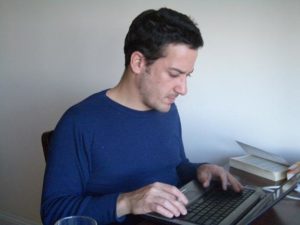 In an electrifying theatrical performance, [Unknown Heroes] tells the interlocking stories of a band of Jewish resistance fighters led by a woman in 1943 Berlin, the Nazi SS Captain hunting them down, and his lover, a feisty cabaret singer who lives upstairs from their hideout, and is forced to choose sides.
In an electrifying theatrical performance, [Unknown Heroes] tells the interlocking stories of a band of Jewish resistance fighters led by a woman in 1943 Berlin, the Nazi SS Captain hunting them down, and his lover, a feisty cabaret singer who lives upstairs from their hideout, and is forced to choose sides.
The play, written and directed by Robert Williams, is framed by the testimonies of Anne and Eva, the now-grown daughters of Miriam, the soulful Jewish resistance fighter, and Klara, the fiery redheaded singer, who present the drama as if they’d pieced it together from historical documents they discovered linking their mothers during the war.
The action is presented with a very cinematic flair, with short scenes, cliff hangers and tension that builds as it reaches a climax, where the resistance fighters, who have information that could save hundreds of Jews, will inevitably have to face the Nazis, who are closing in as time runs out.
What makes this story different from other dramatizations about the Holocaust is that, only in New York City, it seems, could a, descendant of captain in Mussolini’s fascist army, write and direct an emotionally riveting play that ties together these three different narratives. Williams shows the humanity not only in the band of Jewish resistance fighters, a story often retold, but also the pressure faced by the Nazi commanders, as the war turned against them, and, most importantly, profiles the Germans who stood up as righteous gentiles after recognizing the enormity of the Nazi war machine that was slaughtering the Jewish people en masse.
Fittingly, in one of its most gut-wrenching scenes, Wolfgang, the cabaret singer’s brother, a German soldier, who returns home wounded, physically and psychologically, from the Russian front where he admits to his sister that he lost his humanity and felt the death of his soul when forced by his commanding officers to lead the Jews from a village to dig one of the infamous Nazi trenches before lining up for their own deaths by firing squad. The pathos is even deeper – and it’s worth revealing the scene because it was just so powerful – as Wolfgang tells of his childhood friend in the same battalion who cocks his rifle to kill the Jewish children on the trench in front of him, but refuses the order, and he, himself, is shot dead in the temple by his own commander.
In a cast interview with The Algemeiner, Williams said the prologue by the daughters of Miriam and Klara was added, as well as another pivotal scene – also worth revealing – that showed the Jewish resistance fighters, played very believably by non-Jews Luke Bond , Matt McAllister, and Ian Potter, debating the philosophical argument behind their actions, which resonated as true then as it did 70 years later. And not to give the impression that the play is another drawn-out philosophical dialectic, William was successful in also wanting to show the action involved with actually being a resistance fighter, featuring them smuggling guns to prepare for their battle and a real Hollywood-style confrontation that – without revealing what happens – convinced the playwright to begin work on the screenplay adaptation of the story.
The real pathos in the play comes from the scenes where Hilary Walker, who plays Miriam, the leader of the resistance, interacts with her real-life friend, the German actress Gudron Buhler, who plays Klara, the cabaret singer. From the start, Klara’s questioning of Gunter, her SS Captain lover, about rumors she’s heard of Jews being killed for being Jewish, sets the scene for her to play her role as the righteous gentile, but in speaking with Buhler after the performance about her own feelings as the real-life German in the play, indeed, as much as Jews are taught to never forget, the Germans of this third generation since the Holocaust have been taught the same. In her view, the only rationale for the law-abiding German people to have gone along with the final solution during the war is summed up in only one word, “madness.”
Of the other featured players, Ron Nunni playing Gunter, Kazi Tauginas has the Nazi heel-toe march down pat, and shows the Nazi training, never looking his commanding officer in the eye.
The play also received the “Good Housekeeping Seal of Approval” from Elizabeth Bettina, a very knowledgeable member of the audience in last Sunday’s matinee, who wrote the book ‘It Happened in Italy,’ about the righteous gentiles there who also risked their lives to save the Jews living in their midst.
A Roman Catholic who grew up in Jericho, New York, where she considered herself “Jewish by association,” Bettina told The Algemeiner, “The Talmud says if you save a life, you save the world. Since writing the book, what has amazed me most was meeting the grandchildren of the children of the Jews who survived in Italy, and connecting them back to the righteous ones there who had saved them – we actually flew over to meet them. There’s a lesson here about the ‘goodness’ of people who stand up to save even one life, that one life can beget so many more, and I think this play tells that story very powerfully.”
Joshua Levitt
The Algemeiner
Managing Editor


![yellow-stars-poster-2014-650x4341[3]](https://unknownheroes.net/wp-content/uploads/2014/01/yellow-stars-poster-2014-650x43413-590x250.png)
